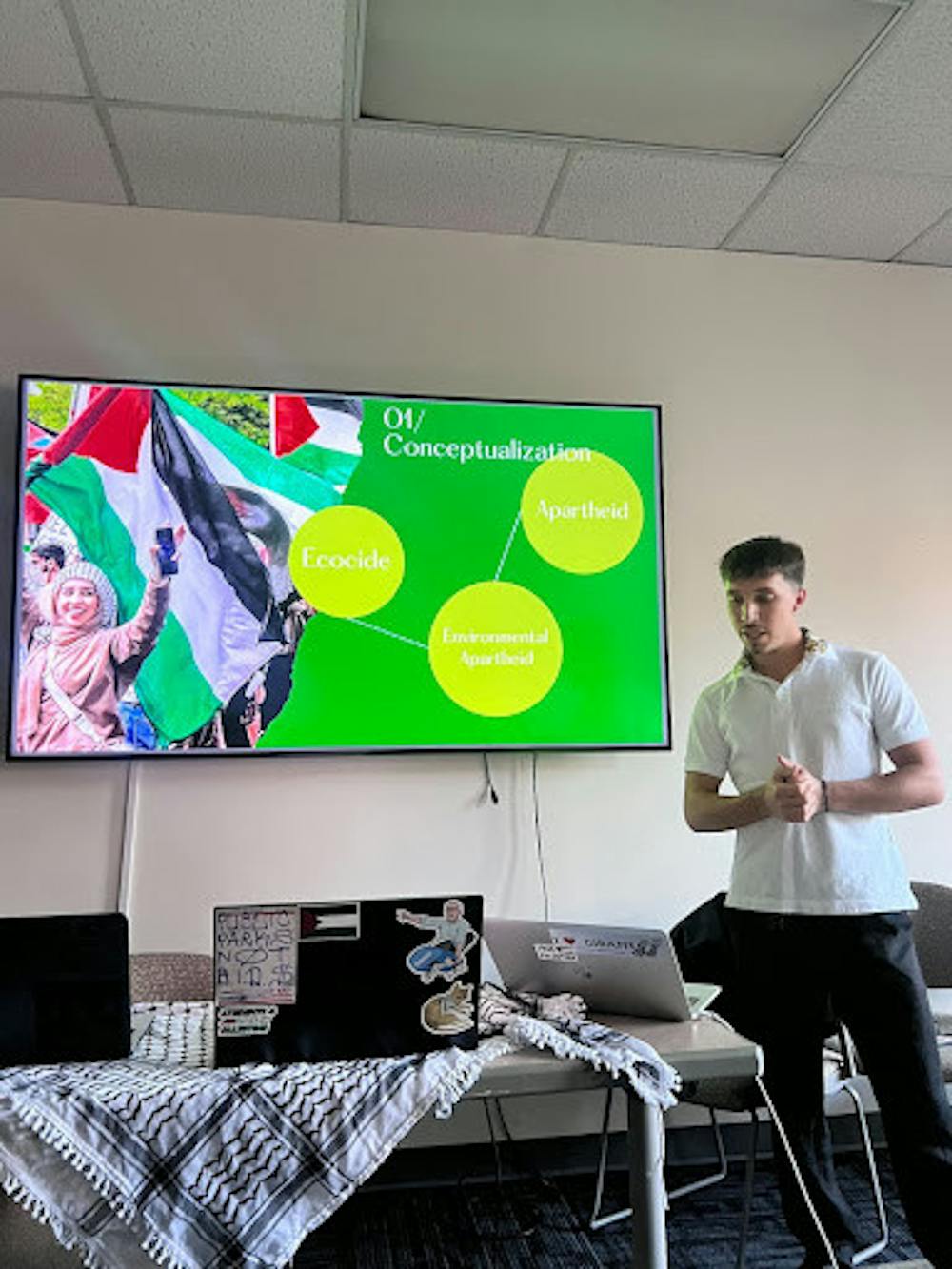Dimitri Tsolakis, a senior in the School of International Service, opened the Students for Justice in Palestine’s first teach-in of the year on Oct. 2. Titled “Environmental Justice in Palestine,” Tskolakis told the crowd to add two new concepts to their advocacy toolbox.
Ecocide, Tsolakis said, is the intentional destruction of the natural environment by deliberate or negligent human action.
“Environmental apartheid, in this case, refers to the Israelis’ systematic exploitation of the environment in Palestine,” Tsolakis said during the presentation. “And the discriminatory systems by which Palestinians are dispossessed of their land, water and other natural resources.”
The presentation cited a World Health Organization report from 2020 which found 97 percent of the available water in the Gaza Strip unfit for consumption. From this spot on the coast, pollution has leaked into the Mediterranean Sea, damaging marine life and health.
SJP e-board member Sujood Tayeh, a senior in the School of Public Affairs, said Israel is one of the biggest proprietors of greenwashing. Often associated with big business and fossil fuel companies, greenwashing is a misleading policy or advertisement claiming an action or item as sustainable or environmentally friendly when it is not.
The presentation focused in part on examples of greenwashing that have impacted Palestine. Alongside the establishment of the Israel Climate Forum in 2021, Israel promised an 85 percent greenhouse gas reduction by 2050. Still, the Sustainable Governance Indicators rank Israel low on environmental policy and action.
Israel’s status as the 10th largest weapons exporter in the world is partially responsible. Amnesty International reports arms deals contribute to increased air pollution and widespread ecological damage. The teach-in included all of this information.
“When you see [greenwashing], it’s crazy,” Tayeh said. “I feel like if people knew about this, they would be more supportive of Palestine.”
Alongside summer photos of sewage overflow taken by SJP members was 2021 data from The Applied Research Institute - Jerusalem naming illegal Israeli settlements responsible for dumping wastewater onto Palestinian land.
Tsolakis said those who live near wastewater experience higher cancer rates. He pointed to the data on exponential water pollution in Gaza, in correlation with a study published in the Journal of Cancer Research and Clinical Oncology on rising cancer rates in the region.
Likewise, the presentation introduced olive tree deforestation as another source of environmental destruction. According to the Al Jazeera Media Network, olive trees provide income for 80,000 to 100,000 Palestinian families.
In 2023, The Yale Review of International Studies found that olive trees contribute to 14 percent of Palestine’s economy, yet since 1967, more than 800,000 Palestinian olive trees have been uprooted by Israeli authorities, with 9,000 removed in August 2021.
Tsolakis linked this deforestation to soil erosion, crop reduction and the release of carbon. Exacerbating the situation, he said, is the replacement of olive trees with non-native plants unsuitable for the region’s ecology.
Known as the land of olives and vines, Tayeh said the environmental destruction brings the occupation into a new light.
“Our land is our light, for Palestinians’ land is so important,” Tayeh said. “The olive trees, the agriculture, olive tree season is a whole celebration.”
Tsolakis ended the presentation with a list of international laws that Israel’s “environmental apartheid” has violated, including the Rome Statute declared by the International Criminal Court in 1998 and enacted in 2002.
The SJP cited two prominent articles from the statute. Article 8(2)(b)(iv) criminalizing “extensive destruction and appropriation of property, not justified by military necessity and carried out unlawfully and wantonly” as a war crime; and Article 6(c) “deliberately inflicting on the group conditions of life calculated to bring about its physical destruction in whole or in part” as a practice of genocide.
SJP hopes that by examining Palestine through an environmental lens, they connect more people to Palestinian advocacy and education. Human rights, Tayeh said, is something everyone should relate to.
“It’s really important to connect Palestine to other similar struggles,” Tayeh said. “I hope people can recognize that their voice matters and being educated matters.”
Correction: A previous version of this article stated that "greenwashing is a misleading policy of advertisement" instead of "greenwashing is a misleading policy or advertisement." The article has been updated with the correct spelling.
This article was edited by Souyma Sahay, Patricia McGee and Abigail Pritchard. Copy editing done by Isabelle Kravis, Olivia Citarella and Charlie Mennuti.





